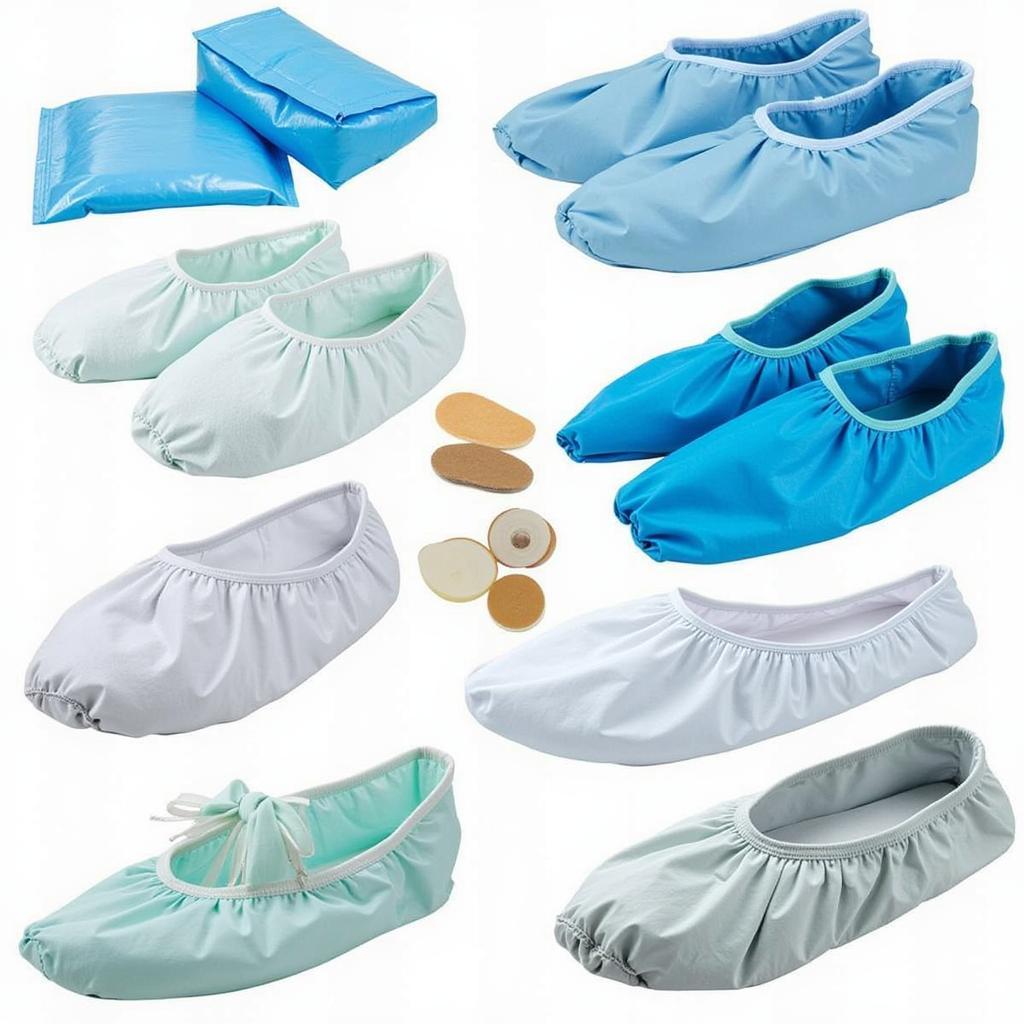Shoe covers have become a ubiquitous sight in hospitals, playing a crucial role in maintaining a sterile and hygienic environment. They act as a barrier, preventing the spread of harmful bacteria and pathogens that can cling to footwear. But what exactly are shoe covers for hospitals, and why are they so important?
Understanding the Importance of Shoe Covers in Hospitals
Hospitals are havens for healing, but they also house a high concentration of vulnerable individuals and infectious agents. Every day, healthcare workers, patients, and visitors traverse the hallways, unknowingly carrying microorganisms on their shoes. These microorganisms, often invisible to the naked eye, can pose serious health risks, especially to those with compromised immune systems.
This is where shoe covers come into play. By encasing footwear, they create a protective shield, preventing the transfer of contaminants from the outside environment into critical areas of the hospital. This simple yet effective measure significantly contributes to:
- Infection Control: Shoe covers act as a physical barrier, minimizing the risk of cross-contamination between different areas of the hospital. This is particularly important in operating rooms, intensive care units, and isolation wards where even the smallest amount of bacteria can have serious consequences.
- Patient Safety: By reducing the spread of infection, shoe covers directly contribute to patient safety. They help create a cleaner and healthier healing environment, minimizing the risk of hospital-acquired infections (HAIs) and promoting faster recovery.
- Compliance with Regulations: Healthcare facilities are subject to stringent hygiene regulations and standards. Using shoe covers helps hospitals meet these requirements, ensuring a safe and compliant environment for both patients and staff.
 Different Types of Shoe Covers for Hospitals
Different Types of Shoe Covers for Hospitals
Exploring Different Types of Shoe Covers
Shoe covers for hospitals are not one-size-fits-all. They come in various materials, sizes, and designs to cater to specific needs and situations. Some common types include:
- Disposable Shoe Covers: Made from materials like polyethylene or polypropylene, these are cost-effective and convenient for single use. They are commonly used in areas with high traffic or where sterility is paramount, such as operating rooms and laboratories.
- Reusable Shoe Covers: Often crafted from durable fabrics like nylon or polyester, these can be laundered and reused multiple times. They are suitable for areas where contamination risks are lower, such as administrative offices or waiting areas.
- Non-Slip Shoe Covers: These feature textured soles to provide extra grip on slippery surfaces, enhancing safety for healthcare workers. They are often used in areas where spills are common, such as kitchens or laboratories.
Choosing the Right Shoe Covers for Your Needs
Selecting the appropriate shoe cover depends on several factors, including:
- Level of Risk: Areas with high infection risks, such as operating rooms, require disposable, impermeable shoe covers for maximum protection.
- Frequency of Use: For areas with frequent foot traffic, disposable shoe covers are more practical. In contrast, reusable shoe covers may be suitable for areas with less frequent use.
- Durability Requirements: Areas where shoe covers are likely to encounter sharp objects or harsh chemicals may require more durable materials.
By carefully considering these factors, hospitals can choose shoe covers that effectively balance protection, practicality, and cost-effectiveness.
Shoe Covers: A Small Step Towards a Safer Environment
Shoe covers, while seemingly insignificant, play a vital role in maintaining a safe and sterile hospital environment. They represent a proactive approach to infection control, protecting both patients and healthcare professionals. By understanding the importance of shoe covers and choosing the right type for specific needs, hospitals can contribute to a healthier and safer environment for everyone.
Remember, every step counts when it comes to hygiene in healthcare.
Frequently Asked Questions About Shoe Covers for Hospitals
1. Are shoe covers mandatory in all areas of a hospital?
While not always mandatory in all areas, shoe covers are typically required in critical areas like operating rooms, intensive care units, and isolation wards.
2. Can I wear my own shoes under shoe covers?
Yes, shoe covers are designed to be worn over your regular footwear. However, it’s important to choose shoe covers that fit comfortably and securely over your shoes to prevent slipping or tripping.
3. How often should shoe covers be changed?
Ideally, shoe covers should be changed every time you enter a new area of the hospital, especially when moving from a potentially contaminated area to a clean area.
4. Are there different sizes of shoe covers available?
Yes, shoe covers come in various sizes to accommodate different shoe sizes. It’s important to choose a size that fits snugly but comfortably.
5. What is the best way to dispose of used shoe covers?
Used shoe covers should be disposed of in designated biohazard containers.
Common Shoe Cover Scenarios:
Scenario 1: A surgeon is about to enter the operating room for a complex surgery.
Solution: The surgeon would wear sterile, disposable shoe covers to minimize the risk of introducing any contaminants into the sterile surgical field.
Scenario 2: A visitor is entering the room of a patient who has a compromised immune system.
Solution: The visitor would wear shoe covers to protect the patient from potential infections.
Scenario 3: A nurse is cleaning up a spill in the hallway.
Solution: The nurse would wear non-slip shoe covers to prevent slipping and ensure their safety while cleaning.
For more information on footwear suitable for hospital settings, you can explore our articles on hospital boots and what to wear home from the hospital.
If you have any further questions or need assistance, please contact us at Phone Number: 02437655121, Email: [email protected] or visit us at Address: 298 Cau Dien Street, Minh Khai, Bac Tu Liem, Hanoi, Vietnam. Our dedicated customer support team is available 24/7 to assist you.